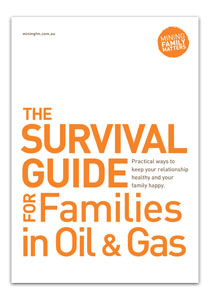
The newest survival guide is out from the mining family matters girls and its just a little bit fab..cost is just $24.95 and its a great even if you are not offshore or FIFO its full of great information on keeping your family just a that great!
Avoiding fights about jealousy and helping kids to cope when you’re working away: these are among many issues tackled in a new guide for families in oil and gas.
The Survival Guide for Families in Oil & Gas is a 32-page, A5 booklet featuring professional advice from MiningFM’s psychologist Angie Willcocks and practical tips for keeping families strong and healthy despite lengthy periods apart. It’s targeted at energy companies for distribution to new and existing employees on FIFO and DIDO (drive-in, drive-out) rosters, or living in remote mining communities.
The guidebook is an initiative of Mining Family Matters and based on the successful Survival Guide for Mining Families, which is nearing 80,000 in sales.
Chapters in The Survival Guide for Families in Oil & Gas include:
- What to expect in the first few months of FIFO
- Building resilience in your kids
- Women in oil and gas
- Tackling loneliness when you’re apart
- Are you making excuses about sex?
“Families in oil and gas come up against many of the same pressures as other FIFO families,” says Mining Family Matters creator Alicia Ranford. “But there are some unique issues, including the added pressure of longer rosters, plus limited communication from offshore rigs and remote sites.
“We urge families to focus on the positives of the job – like the extended periods together during time off and the good wages – but we also arm them with simple strategies to cope if the going gets tough.
“Our oil and gas mum Debbie Russo, who writes for us on MiningFM, sends an email to her husband and uploads photos of the kids every day he’s away, even if he doesn’t get the messages for a few days. It’s their way of staying connected, and similar strategies can be easily adopted or adapted.”
For further information and pricing details: The Survival Guide for Families in Oil & Gas
Strategies for success in the Survival Guide for Families in Oil & Gas:
- Staying in touch: We all have different ways of dealing with difficult situations. Some people need as much contact as possible to feel connected. Others prefer to withdraw, and find that limited contact helps them cope. So if your FIFO partner seems distant and unwilling to remain on the phone in the early days, try not to take it personally.
- Setting routines: For those on FIFO rosters, how ‘home’ time is spent can become a major source of conflict. Practical suggestions that work for some couples include agreeing from the outset on a set number of nights that will be spent together and socialising together or apart.
- Women in oil and gas: It’s important not to fall into unhelpful thinking patterns such as ‘magnifying’ (blowing a problem out of proportion), ‘personalising’ (making the problem all about you) and ‘over-generalising’ (making any problem about your gender, when the issue might actually have nothing to do with it).
- Overcoming jealousy: We’ve heard that jealousy and insecurity are sometimes a problem when workers are getting used to extended rosters on oil rigs. Apparently, some workers think it’s fun to joke about partners having affairs back home. Just tell yourself “everyone’s got a story and their story is not my story”. Change the subject or leave the conversation altogether.
- Friends and family: Encourage the ‘away’ partner to keep in regular contact with friends and family via phone or email when away. Encourage the ‘home’ partner to make plans to see friends and family even when the ‘away’ worker is home. This eases the pressure on you both.
- Increasing intimacy: Differing libidos challenge most long-term relationships. When sex becomes a major issue, the lower libido partner feels the need to send frequent signals that “I am definitely not in the mood”. The result is less intimacy in the whole relationship. That’s when it’s time to break your ‘sex cycle’.
- United parenting: Families separated for work are often good communicators because they take the time to discuss issues instead of assuming that mum/dad will ‘just know’. Some families start every break with a catch-up on purely practical parenting issues. This sends a strong message to the kids that mum and dad are a united team.
- Helping kids to cope: If your child is missing mum/dad, allow them to talk about it and offer an extra cuddle. Avoid saying things like “be brave” or “don’t be silly” because your child might begin to hide feelings away from you, thinking that you are not interested or that they are unacceptable feelings to discuss.
- Family rules: Depending on the age of your kids, involve them in the creation of family rules to stick on the fridge. Remember the golden rule for FIFO families: the rules apply all the time, whether you are home or not. Standard rules are very important for kids in hectic households
xx Deb